
Operation Fortitude was a military deception operation by the Allied nations as part of Operation Bodyguard, an overall deception strategy during the buildup to the 1944 Normandy landings. Fortitude was divided into two subplans, North and South, and had the aim of misleading the German High Command as to the location of the invasion.

Cecil Day-Lewis, often written as C. Day-Lewis, was an Anglo-Irish poet and Poet Laureate from 1968 until his death in 1972. He also wrote mystery stories under the pseudonym of Nicholas Blake, most of which feature the fictional detective Nigel Strangeways.

HM Prison Manchester is a Category A and B men's prison in Manchester, England, operated by His Majesty's Prison Service. It is still commonly referred to as Strangeways, which was its former official name derived from the area in which it is located, until it was rebuilt following a major riot in 1990.
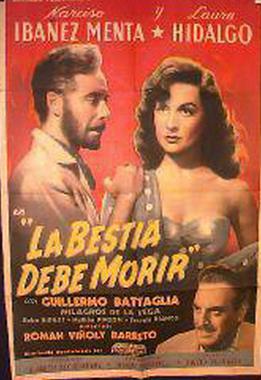
The Beast Must Die is a 1952 Argentine thriller film directed by Román Viñoly Barreto and starring Laura Hidalgo Guillermo Battaglia and Narciso Ibáñez Menta. It based on the 1938 novel The Beast Must Die by Irish writer Cecil Day-Lewis, part of his series featuring the private detective Nigel Strangeways.
Nigel Strangeways is a fictional British private detective created by Cecil Day-Lewis, writing under the pen name of Nicholas Blake. He was one of the prominent detectives of the Golden Age of Detective Fiction, appearing in sixteen novels between 1935 and 1966. He also features in a couple of short stories.

Minute for Murder is a 1947 crime novel by Cecil Day-Lewis, written under the pen name of Nicholas Blake. It is the eighth in a series of novels featuring the private detective Nigel Strangeways, and the first published following the Second World War. The hero begins the film employed at the Ministry of Morale, modelled on the Ministry of Information that Day-Lewis had worked for during wartime.

The Dreadful Hollow is a 1953 detective novel by Cecil Day-Lewis, written under the pen name of Nicholas Blake. It is the tenth in a series of novels featuring the private detective Nigel Strangeways.

There's Trouble Brewing is a 1937 detective novel by Cecil Day-Lewis, written under the pen name of Nicholas Blake. It is the third in a series of novels featuring the private detective Nigel Strangeways.

The Worm of Death is a 1961 detective novel by the Anglo-Irish writer Cecil Day-Lewis, written under the pen name of Nicholas Blake. It is the fourteenth in a series of novels featuring the private detective Nigel Strangeways.

End of Chapter is a 1957 detective novel by Cecil Day-Lewis, written under the pen name of Nicholas Blake. It is the twelfth in a series of novels featuring the private detective Nigel Strangeways.

The Widow's Cruise is a 1959 British detective novel by Cecil Day-Lewis, written under the pen name of Nicholas Blake. It is the thirteenth in a series of novels featuring the private detective Nigel Strangeways.

The Morning after Death is a 1966 detective novel by Cecil Day-Lewis, written under the pen name of Nicholas Blake. It is the sixteenth and last entry in the series of novels featuring the private detective Nigel Strangeways.
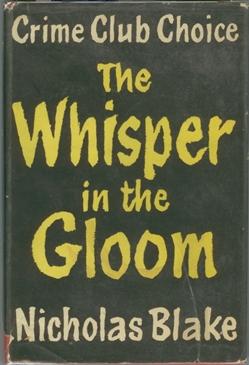
The Whisper in the Gloom is a 1954 detective novel by Cecil Day-Lewis, written under the pen name of Nicholas Blake. It is the eleventh in a series of novels featuring the private detective Nigel Strangeways. The novel introduced the recurring character of Clare Massinger, a young sculptor who becomes a romantic interest of Strangeways.

A Penknife in My Heart is a 1958 crime thriller novel by Cecil Day-Lewis, written under the pen name of Nicholas Blake. It was one of four stand-alone novels he wrote alongside the Nigel Strangeways detective novels.

A Tangled Web is a 1956 British crime novel by Cecil Day-Lewis, written under the pen name of Nicholas Blake. It was one of four stand-alone novels he wrote under the name alongside the Nigel Strangeways detective novels. It was published by Harper in the United States under the alternative title Death and Daisy Bland.
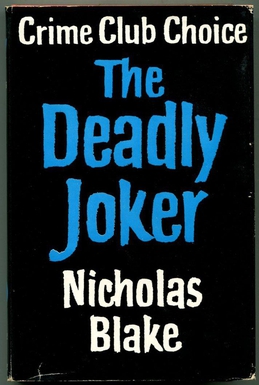
The Deadly Joker is a 1963 mystery novel by the Anglo-Irish writer Cecil Day-Lewis, under his pen name of Nicholas Blake. It was one of four stand-alone novels he wrote under the name alongside the Nigel Strangeways detective novels. It is unusual for the author for being written in a first person narrative from the prospective of the protagonist John Waterson.
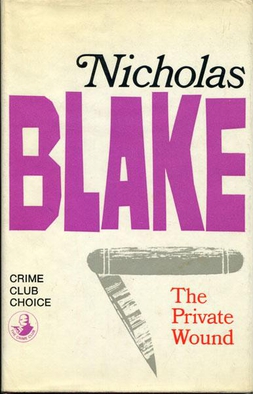
The Private Wound is a 1968 mystery thriller novel by Cecil Day-Lewis, written under the pen name of Nicholas Blake. It was one of four stand-alone novels he wrote alongside the Nigel Strangeways detective novels. The title is taken from a line in William Shakespeare's Two Gentlemen of Verona. It was a runner-up for the Gold Dagger Award of the British Crime Writers' Association.
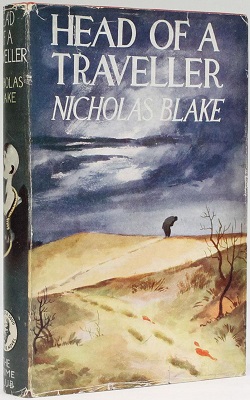
Head of a Traveller is a 1949 detective novel by Cecil Day-Lewis, written under the pen name of Nicholas Blake. It is the ninth in a series of novels featuring the private detective Nigel Strangeways.

A Question of Proof is a 1935 detective novel by Cecil Day-Lewis, written under the pen name of Nicholas Blake. It is the first in a series of novels featuring the private detective Nigel Strangeways. Day-Lewis chose to write under an assumed name as he feared writing in the popular detective genre would harm his growing reputation as a serious-minded poet. Consequently, the publishers Collins advertised the book as being written by a "well-known writer" using a pen name. It was a commercial success selling around 200,000 copies in Britain and launching Day-Lewis, who quickly did become widely identified as the author, as one of the leading writers of the Golden Age of Detective Fiction.

The Beast Must Die is a 1938 detective novel by Cecil Day-Lewis, written under the pen name of Nicholas Blake. It combines elements of the inverted thriller with a classic Golden Age-style investigation. It is the fourth in a series of novels featuring the private detective Nigel Strangeways. The title is inspired by a line in Four Serious Songs by Johannes Brahms, itself a reference to Ecclesiastes.



















